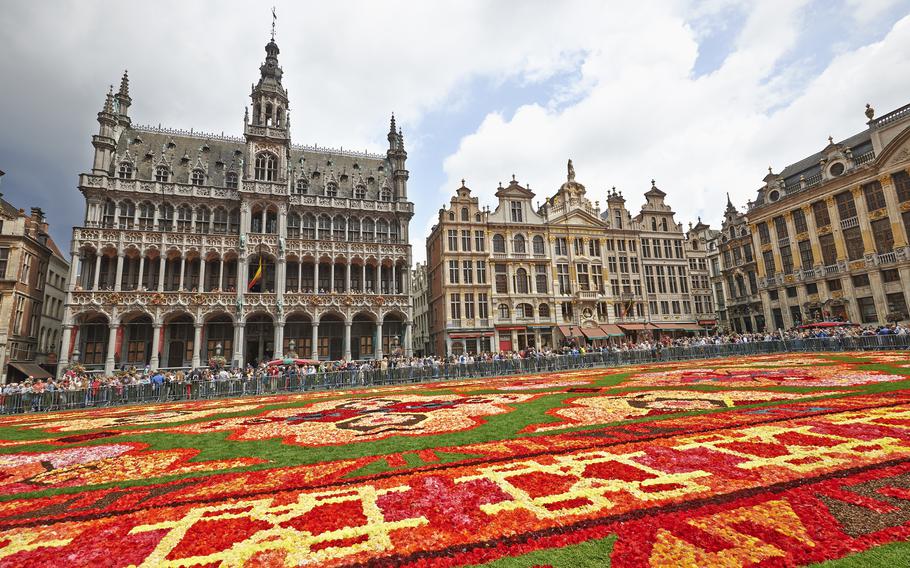
Every other year, the Grand Palace courtyard in Brussels, Belgium, “grows” a flower carpet. This year’s display is visible the weekend of Aug. 12-15. (iStock)
From intricate sculptures of ice and snow that soon melt in the rays of the Alpine sun to papier-mâché effigies destined to go up in flames at the end of Carnival season, Europeans seem to show a soft spot for works of art with short shelf lives. Such ephemeral creations are showcased again in late summer as a spate of floral-inspired events creates a brilliant tableau of irresistible eye candy.
Brussels, Belgium: Through the weekend, Brussels’ glorious Grand-Place becomes all the more dazzling for the presence of the Flower Carpet, a biennial endeavor brought to light through the efforts of 100 volunteers, who deftly assemble the floral creation in under six hours.
Each carpet is a unique work of art, often inspired by the art of other lands, anniversaries or significant milestones. The 2022 edition of the carpet is a “back to the roots” reinterpretation of the very first carpet to have been laid down back in 1971, and like its predecessor half a century ago, will feature arabesque forms and images of Saint Michael, a patron saint of Brussels, and the Belgian Lion.
While earlier editions of the floral tapestry leaned heavily on hardy, weather-resistant begonias, the plant’s dwindling presence in Belgium means dahlias, chrysanthemums and Japanese spindles increasingly find their way into contemporary editions.
The carpet can be viewed from the UNESCO-listed square, as well as from the balcony of the Town Hall. The sound and light shows offered once dusk falls end the experience on a high note.
The carpet can be viewed from the balcony of City Hall from 3 p.m.-6 p.m. Aug. 12 and from 10 a.m.-10 p.m. Aug. 13-15. The sound and light show takes place in thirty-minute intervals from 9:30 p.m.-11 p.m. Aug. 13-15. Adult tickets go for 7 euros; those under age 10 enter free. Tickets are available online, at the Visit Brussels shops or near the City Hall entrance. Online: flowercarpet.brussels/en
Sélestat, France: This Alsatian beauty of a town hosts its annual Corso Fleuri, or flower parade, on Aug. 13. From 6 p.m., the first of 12 floats decorated in keeping with this year’s theme of the diversity of Europe's nature will roll down the Quai de l'Ill. Ensembles of musicians, dancers and jugglers will crisscross the streets of the Old Town. At 10 p.m., an illuminated version of the parade sets forth. Around midnight, fireworks are shot off over the waters of the nearby lake. Visitors can also check out the wares at a handicrafts market or sample wines from the surrounding vineyards. Grandstand seating goes for 20 euros for both parades, or 12 euros for a single spectacle. General entry is free. Online: tinyurl.com/4b2ke24t
Bad Ems, Germany: Last year, this tiny gem of a spa town on the Lahn River joined the ranks of UNESCO World Heritage Sites as one of 11 resorts within a grouping titled “Great Spa Towns of Europe;” finally, it can celebrate in earnest as its Flower Parade and Bartholomew Market return to the scene. On Aug. 28, the “Blumenkorso,” billed as Germany’s largest flower parade, will once again roll through town. About 1.5 million dahlias find their way into the 30 or so floats making up the procession. Between the wagons, marching bands from throughout Europe play their upbeat tunes.
The spectacle always takes place in tandem with a traditional folk festival with roots tracing back to 1379. Here, visitors can enjoy midway games, indulge in their favorite festival snacks and ride on attractions ranging from tame to terrifying.
The parade gets underway at 2 p.m. Entry costs 9 euros for adults and is free for those under the age of 14. Online: blumenkorsobadems.de
Zundert, Netherlands: It takes not just a village but 20 or so tiny towns to pull together the world’s biggest summer flower parade. And it’s not just fun, it’s competition, as a professional jury decides whose float wins the day.
The event takes place on the first Sunday of September, meaning Sept. 4 is the date to make way to the town of Vincent Van Gogh’s birth in 2022. The floats first start moving at 1:30 p.m., and from 6 p.m., they’re parked to allow visitors to admire the artistry up close. Tickets to the parade are available online at a cost of 12 euros; entry to the exhibition area, which also remains open on Sept. 5, costs 5 euros. Tickets bought on parade day itself will cost 15 euros. Those ages 12 and under enter for free. Online: corsozundert.nl